Trade Tariffs, Impact and Competitiveness: Harley Davidson Report
VerifiedAdded on 2023/06/07
|12
|940
|371
Report
AI Summary
This report analyzes the impact of trade tariffs, particularly those between the USA and the EU, on Harley Davidson's production and profitability. The study examines the company's institutional environment, identifying both constraining and enabling forces, such as brand image, loyal customer base, and technological advancements, alongside challenges like narrowed market segments and aggressive competition. The report employs Porter's Five Forces analysis to assess the competitive environment, highlighting factors such as strong competition, customer bargaining power, and the threat of substitutes. It also discusses Harley Davidson's strategic responses, including shifting production to EU locations to mitigate the effects of tariffs and maintain competitiveness in the global market. The conclusion emphasizes the significance of brand value, customer loyalty, and product quality in ensuring Harley Davidson's continued success in the face of international trade challenges.
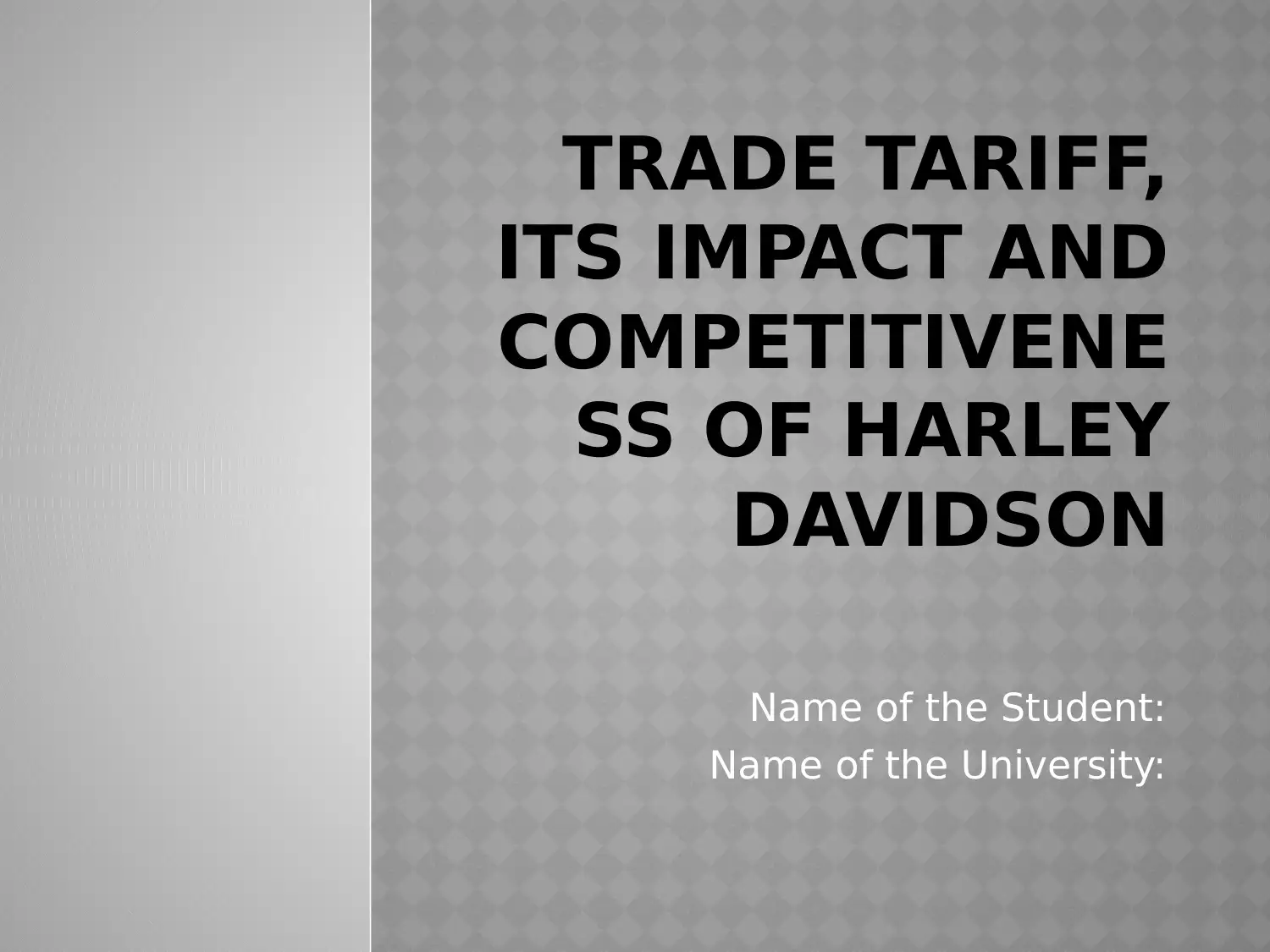
TRADE TARIFF,
ITS IMPACT AND
COMPETITIVENE
SS OF HARLEY
DAVIDSON
Name of the Student:
Name of the University:
ITS IMPACT AND
COMPETITIVENE
SS OF HARLEY
DAVIDSON
Name of the Student:
Name of the University:
Paraphrase This Document
Need a fresh take? Get an instant paraphrase of this document with our AI Paraphraser
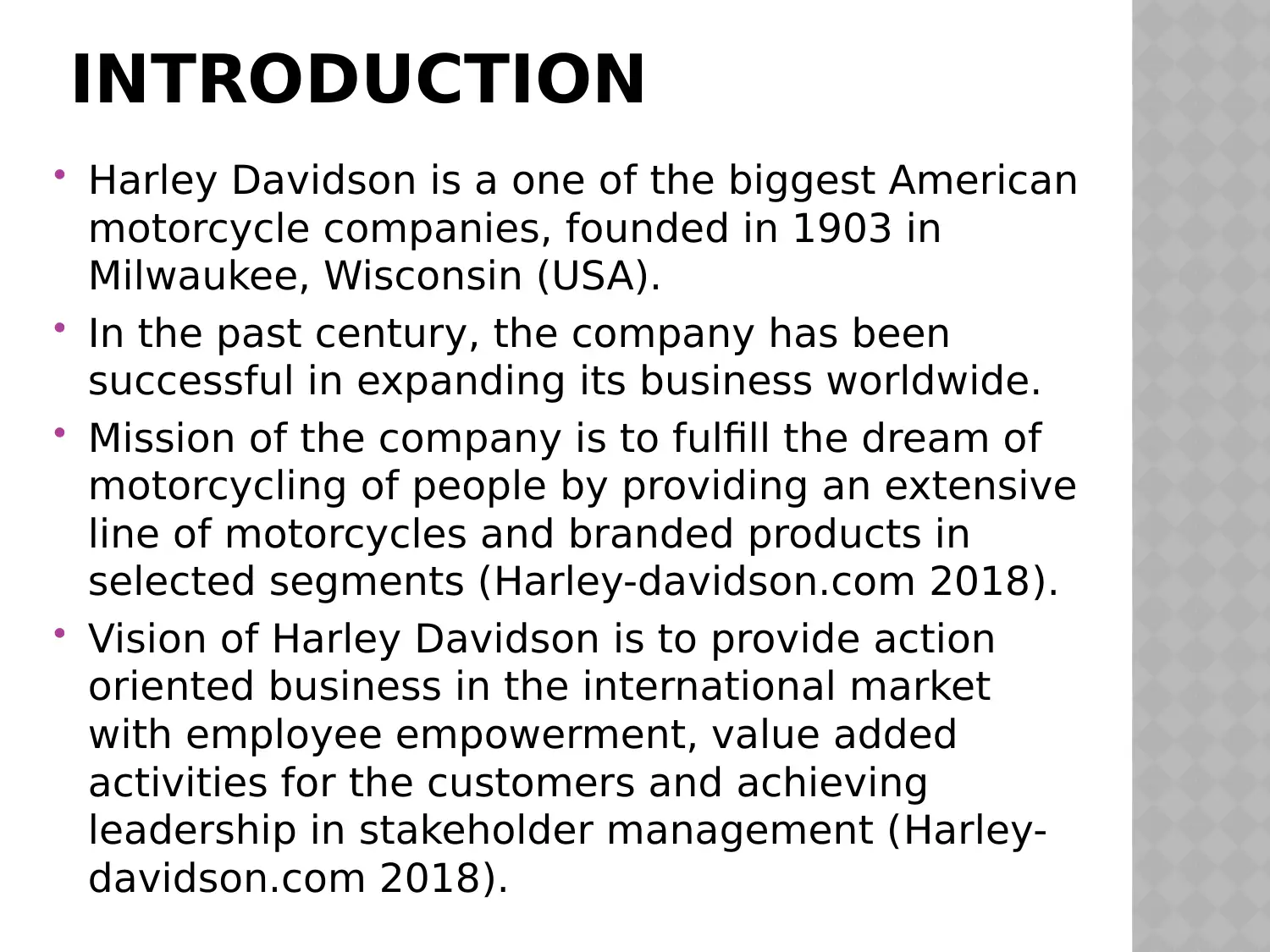
INTRODUCTION
Harley Davidson is a one of the biggest American
motorcycle companies, founded in 1903 in
Milwaukee, Wisconsin (USA).
In the past century, the company has been
successful in expanding its business worldwide.
Mission of the company is to fulfill the dream of
motorcycling of people by providing an extensive
line of motorcycles and branded products in
selected segments (Harley-davidson.com 2018).
Vision of Harley Davidson is to provide action
oriented business in the international market
with employee empowerment, value added
activities for the customers and achieving
leadership in stakeholder management (Harley-
davidson.com 2018).
Harley Davidson is a one of the biggest American
motorcycle companies, founded in 1903 in
Milwaukee, Wisconsin (USA).
In the past century, the company has been
successful in expanding its business worldwide.
Mission of the company is to fulfill the dream of
motorcycling of people by providing an extensive
line of motorcycles and branded products in
selected segments (Harley-davidson.com 2018).
Vision of Harley Davidson is to provide action
oriented business in the international market
with employee empowerment, value added
activities for the customers and achieving
leadership in stakeholder management (Harley-
davidson.com 2018).
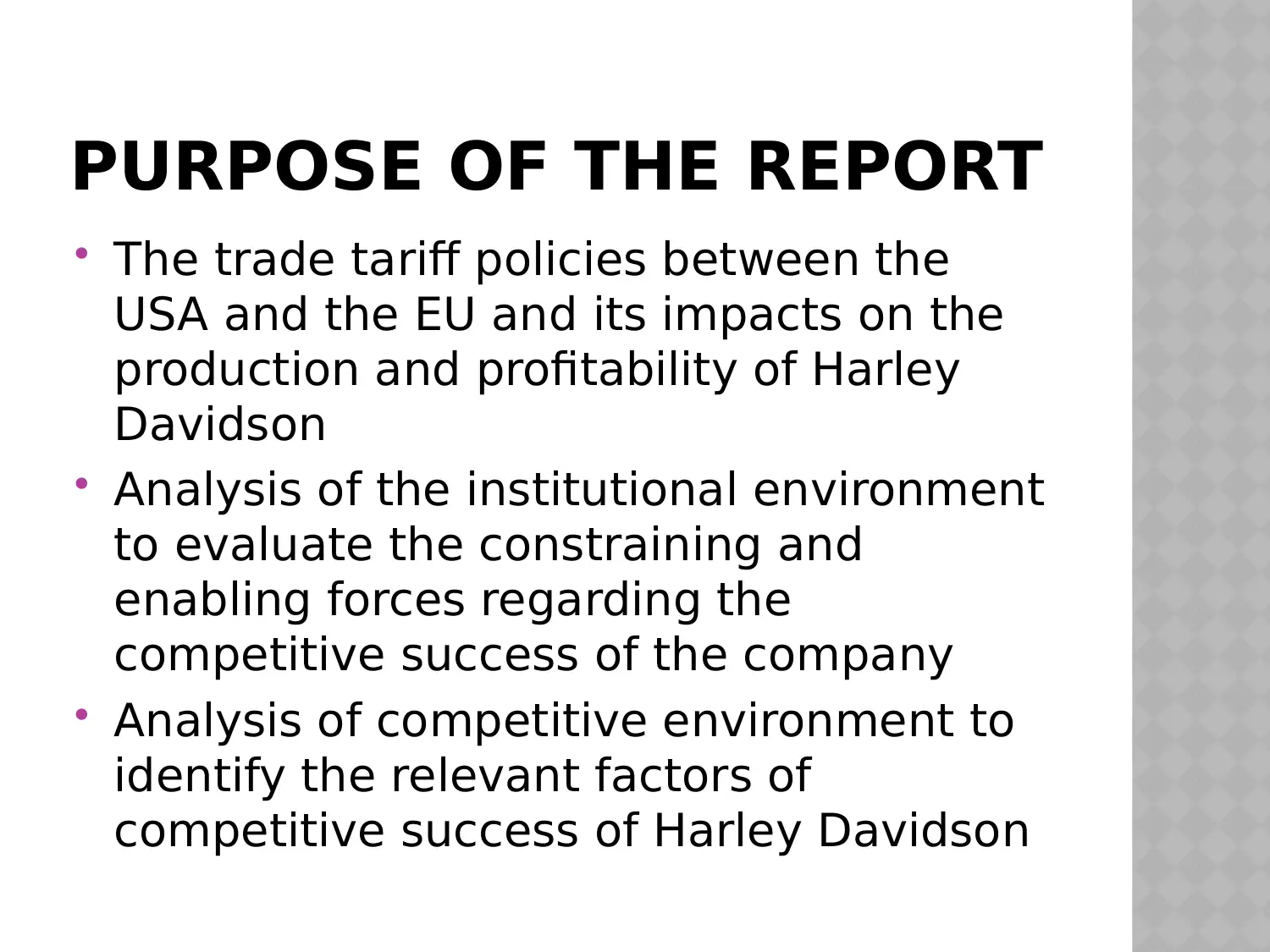
PURPOSE OF THE REPORT
The trade tariff policies between the
USA and the EU and its impacts on the
production and profitability of Harley
Davidson
Analysis of the institutional environment
to evaluate the constraining and
enabling forces regarding the
competitive success of the company
Analysis of competitive environment to
identify the relevant factors of
competitive success of Harley Davidson
The trade tariff policies between the
USA and the EU and its impacts on the
production and profitability of Harley
Davidson
Analysis of the institutional environment
to evaluate the constraining and
enabling forces regarding the
competitive success of the company
Analysis of competitive environment to
identify the relevant factors of
competitive success of Harley Davidson
⊘ This is a preview!⊘
Do you want full access?
Subscribe today to unlock all pages.

Trusted by 1+ million students worldwide
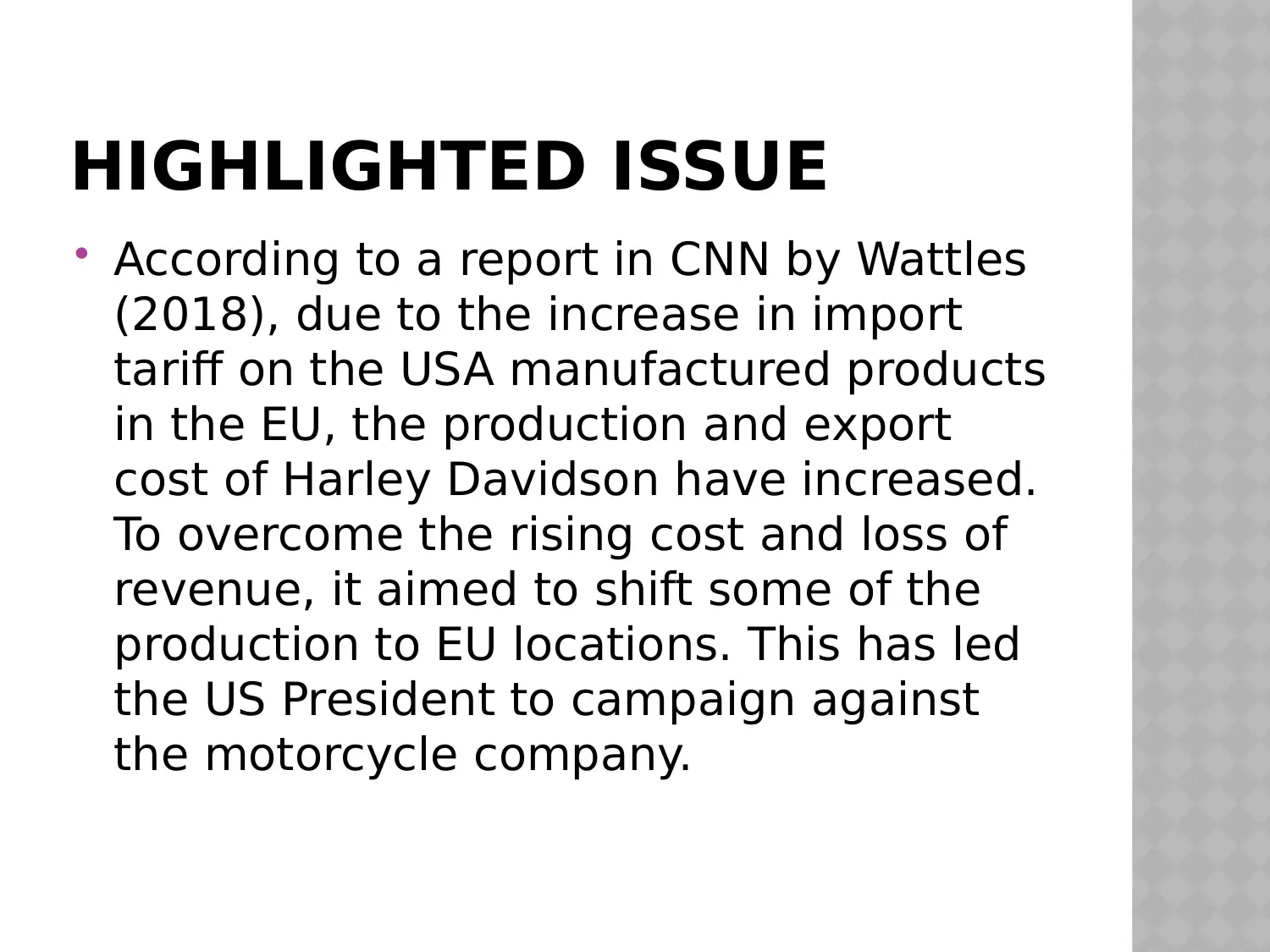
HIGHLIGHTED ISSUE
According to a report in CNN by Wattles
(2018), due to the increase in import
tariff on the USA manufactured products
in the EU, the production and export
cost of Harley Davidson have increased.
To overcome the rising cost and loss of
revenue, it aimed to shift some of the
production to EU locations. This has led
the US President to campaign against
the motorcycle company.
According to a report in CNN by Wattles
(2018), due to the increase in import
tariff on the USA manufactured products
in the EU, the production and export
cost of Harley Davidson have increased.
To overcome the rising cost and loss of
revenue, it aimed to shift some of the
production to EU locations. This has led
the US President to campaign against
the motorcycle company.
Paraphrase This Document
Need a fresh take? Get an instant paraphrase of this document with our AI Paraphraser
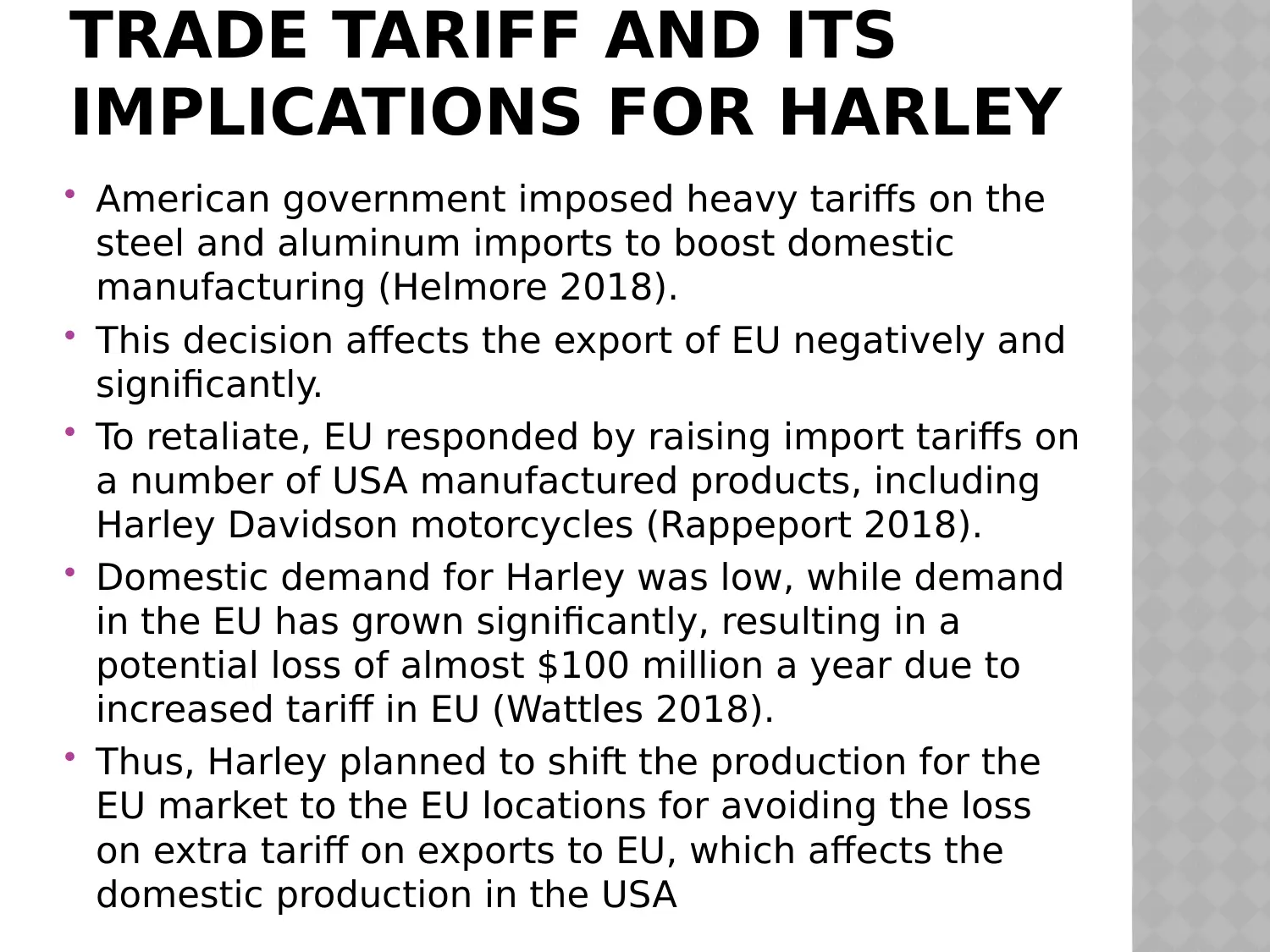
TRADE TARIFF AND ITS
IMPLICATIONS FOR HARLEY
American government imposed heavy tariffs on the
steel and aluminum imports to boost domestic
manufacturing (Helmore 2018).
This decision affects the export of EU negatively and
significantly.
To retaliate, EU responded by raising import tariffs on
a number of USA manufactured products, including
Harley Davidson motorcycles (Rappeport 2018).
Domestic demand for Harley was low, while demand
in the EU has grown significantly, resulting in a
potential loss of almost $100 million a year due to
increased tariff in EU (Wattles 2018).
Thus, Harley planned to shift the production for the
EU market to the EU locations for avoiding the loss
on extra tariff on exports to EU, which affects the
domestic production in the USA
IMPLICATIONS FOR HARLEY
American government imposed heavy tariffs on the
steel and aluminum imports to boost domestic
manufacturing (Helmore 2018).
This decision affects the export of EU negatively and
significantly.
To retaliate, EU responded by raising import tariffs on
a number of USA manufactured products, including
Harley Davidson motorcycles (Rappeport 2018).
Domestic demand for Harley was low, while demand
in the EU has grown significantly, resulting in a
potential loss of almost $100 million a year due to
increased tariff in EU (Wattles 2018).
Thus, Harley planned to shift the production for the
EU market to the EU locations for avoiding the loss
on extra tariff on exports to EU, which affects the
domestic production in the USA
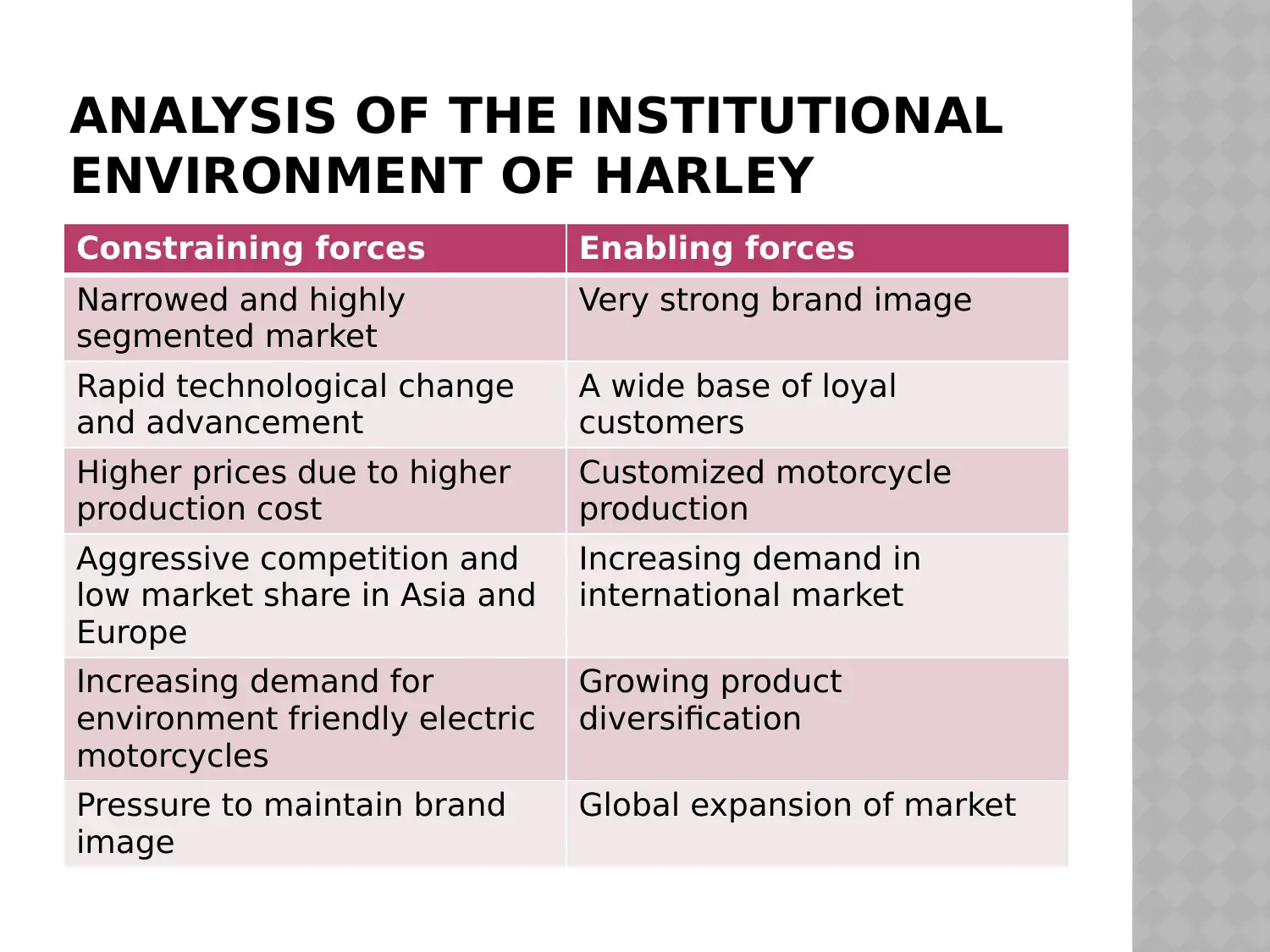
ANALYSIS OF THE INSTITUTIONAL
ENVIRONMENT OF HARLEY
Constraining forces Enabling forces
Narrowed and highly
segmented market
Very strong brand image
Rapid technological change
and advancement
A wide base of loyal
customers
Higher prices due to higher
production cost
Customized motorcycle
production
Aggressive competition and
low market share in Asia and
Europe
Increasing demand in
international market
Increasing demand for
environment friendly electric
motorcycles
Growing product
diversification
Pressure to maintain brand
image
Global expansion of market
ENVIRONMENT OF HARLEY
Constraining forces Enabling forces
Narrowed and highly
segmented market
Very strong brand image
Rapid technological change
and advancement
A wide base of loyal
customers
Higher prices due to higher
production cost
Customized motorcycle
production
Aggressive competition and
low market share in Asia and
Europe
Increasing demand in
international market
Increasing demand for
environment friendly electric
motorcycles
Growing product
diversification
Pressure to maintain brand
image
Global expansion of market
⊘ This is a preview!⊘
Do you want full access?
Subscribe today to unlock all pages.

Trusted by 1+ million students worldwide
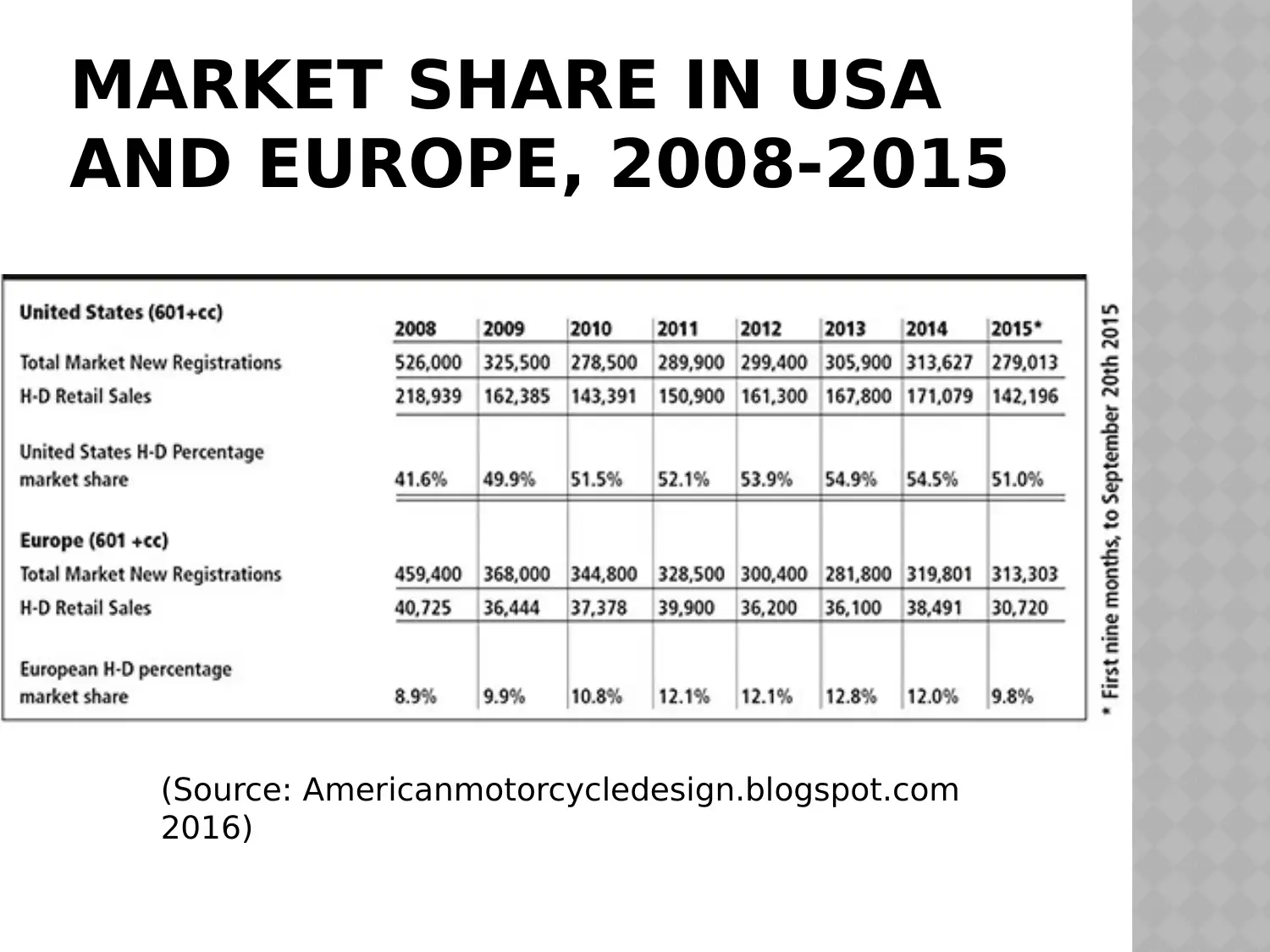
MARKET SHARE IN USA
AND EUROPE, 2008-2015
(Source: Americanmotorcycledesign.blogspot.com
2016)
AND EUROPE, 2008-2015
(Source: Americanmotorcycledesign.blogspot.com
2016)
Paraphrase This Document
Need a fresh take? Get an instant paraphrase of this document with our AI Paraphraser
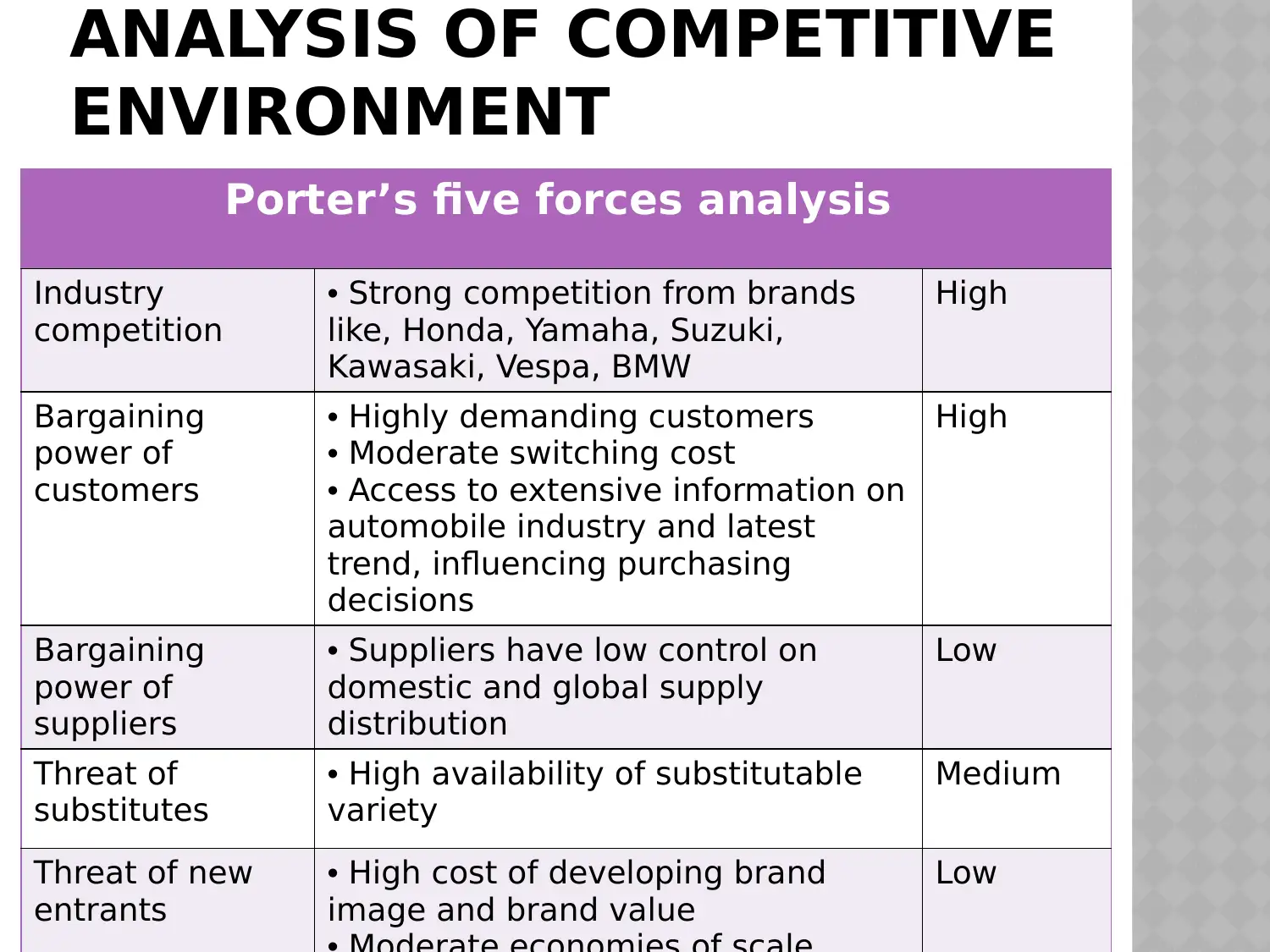
ANALYSIS OF COMPETITIVE
ENVIRONMENT
Porter’s five forces analysis
Industry
competition
• Strong competition from brands
like, Honda, Yamaha, Suzuki,
Kawasaki, Vespa, BMW
High
Bargaining
power of
customers
• Highly demanding customers
• Moderate switching cost
• Access to extensive information on
automobile industry and latest
trend, influencing purchasing
decisions
High
Bargaining
power of
suppliers
• Suppliers have low control on
domestic and global supply
distribution
Low
Threat of
substitutes
• High availability of substitutable
variety
Medium
Threat of new
entrants
• High cost of developing brand
image and brand value
Low
ENVIRONMENT
Porter’s five forces analysis
Industry
competition
• Strong competition from brands
like, Honda, Yamaha, Suzuki,
Kawasaki, Vespa, BMW
High
Bargaining
power of
customers
• Highly demanding customers
• Moderate switching cost
• Access to extensive information on
automobile industry and latest
trend, influencing purchasing
decisions
High
Bargaining
power of
suppliers
• Suppliers have low control on
domestic and global supply
distribution
Low
Threat of
substitutes
• High availability of substitutable
variety
Medium
Threat of new
entrants
• High cost of developing brand
image and brand value
Low
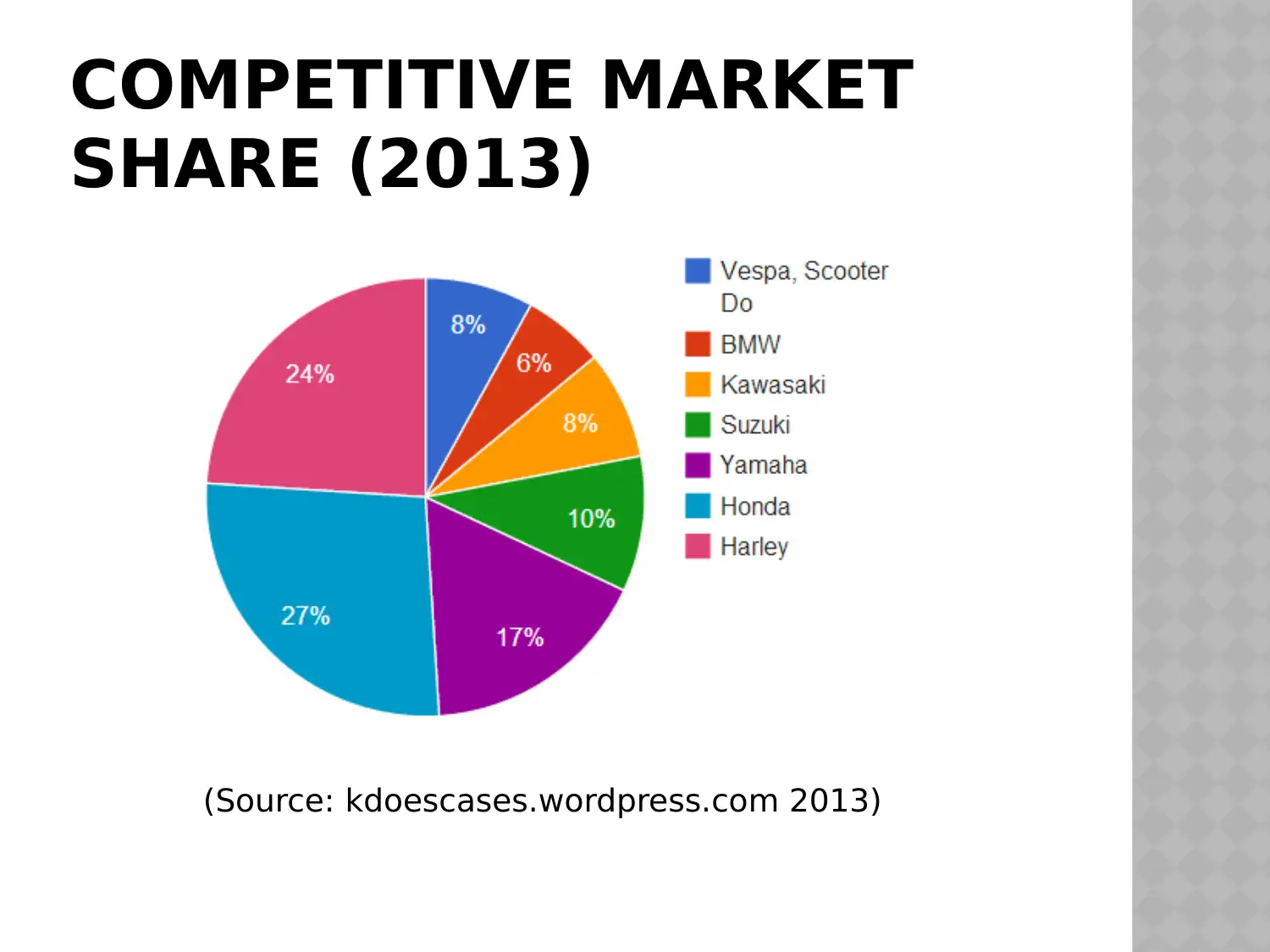
COMPETITIVE MARKET
SHARE (2013)
(Source: kdoescases.wordpress.com 2013)
SHARE (2013)
(Source: kdoescases.wordpress.com 2013)
⊘ This is a preview!⊘
Do you want full access?
Subscribe today to unlock all pages.

Trusted by 1+ million students worldwide
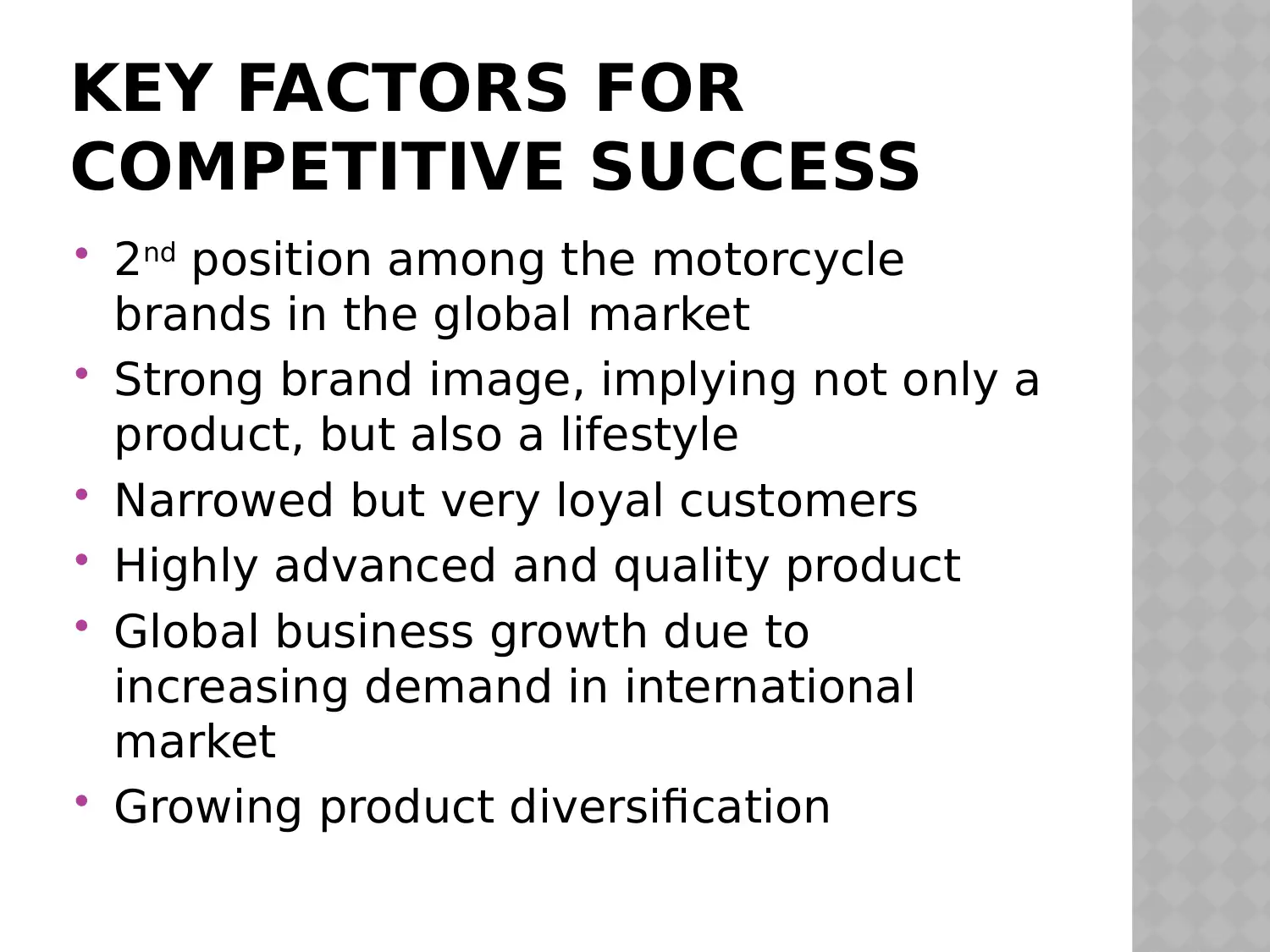
KEY FACTORS FOR
COMPETITIVE SUCCESS
2nd position among the motorcycle
brands in the global market
Strong brand image, implying not only a
product, but also a lifestyle
Narrowed but very loyal customers
Highly advanced and quality product
Global business growth due to
increasing demand in international
market
Growing product diversification
COMPETITIVE SUCCESS
2nd position among the motorcycle
brands in the global market
Strong brand image, implying not only a
product, but also a lifestyle
Narrowed but very loyal customers
Highly advanced and quality product
Global business growth due to
increasing demand in international
market
Growing product diversification
Paraphrase This Document
Need a fresh take? Get an instant paraphrase of this document with our AI Paraphraser
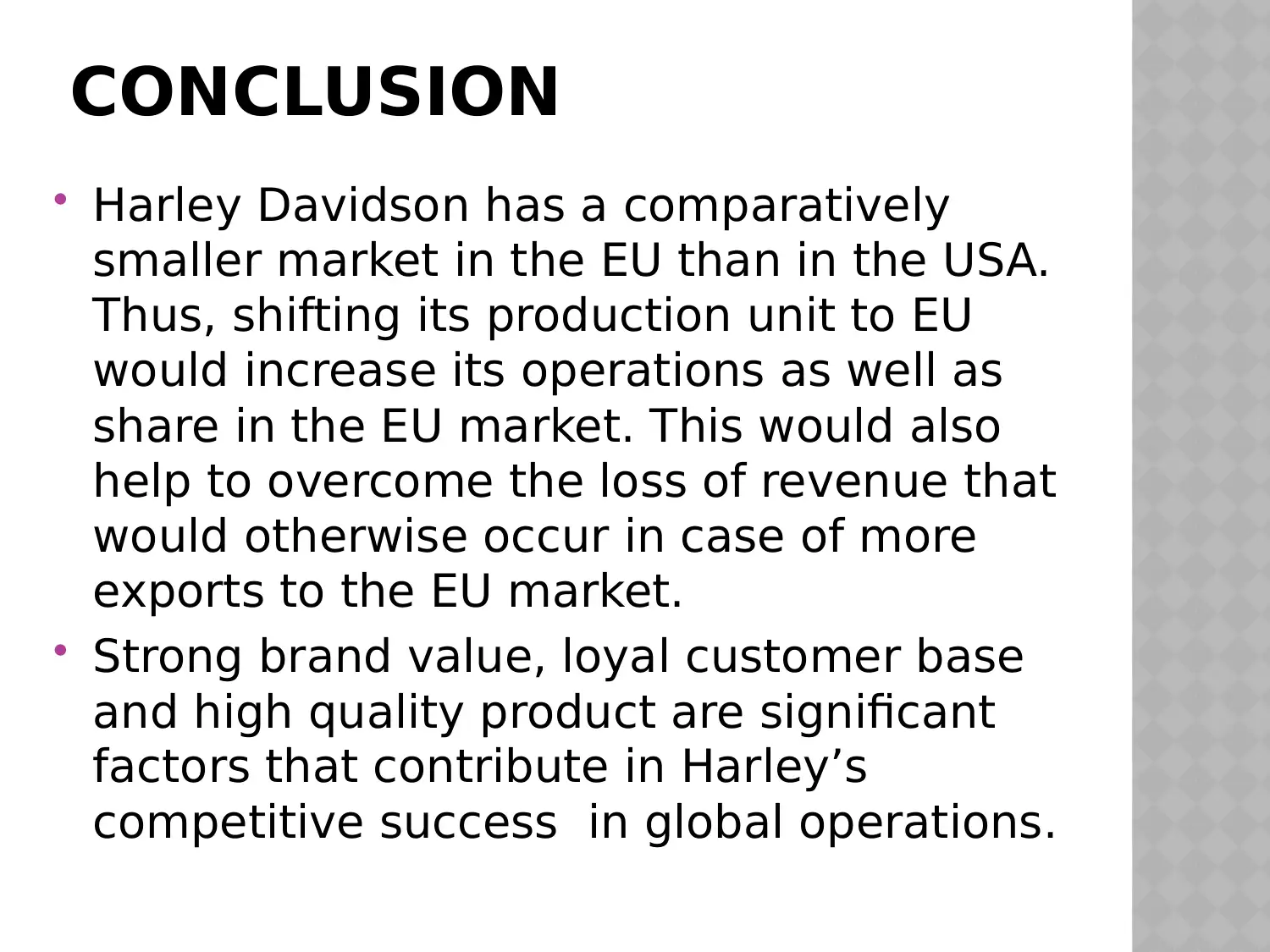
CONCLUSION
Harley Davidson has a comparatively
smaller market in the EU than in the USA.
Thus, shifting its production unit to EU
would increase its operations as well as
share in the EU market. This would also
help to overcome the loss of revenue that
would otherwise occur in case of more
exports to the EU market.
Strong brand value, loyal customer base
and high quality product are significant
factors that contribute in Harley’s
competitive success in global operations.
Harley Davidson has a comparatively
smaller market in the EU than in the USA.
Thus, shifting its production unit to EU
would increase its operations as well as
share in the EU market. This would also
help to overcome the loss of revenue that
would otherwise occur in case of more
exports to the EU market.
Strong brand value, loyal customer base
and high quality product are significant
factors that contribute in Harley’s
competitive success in global operations.
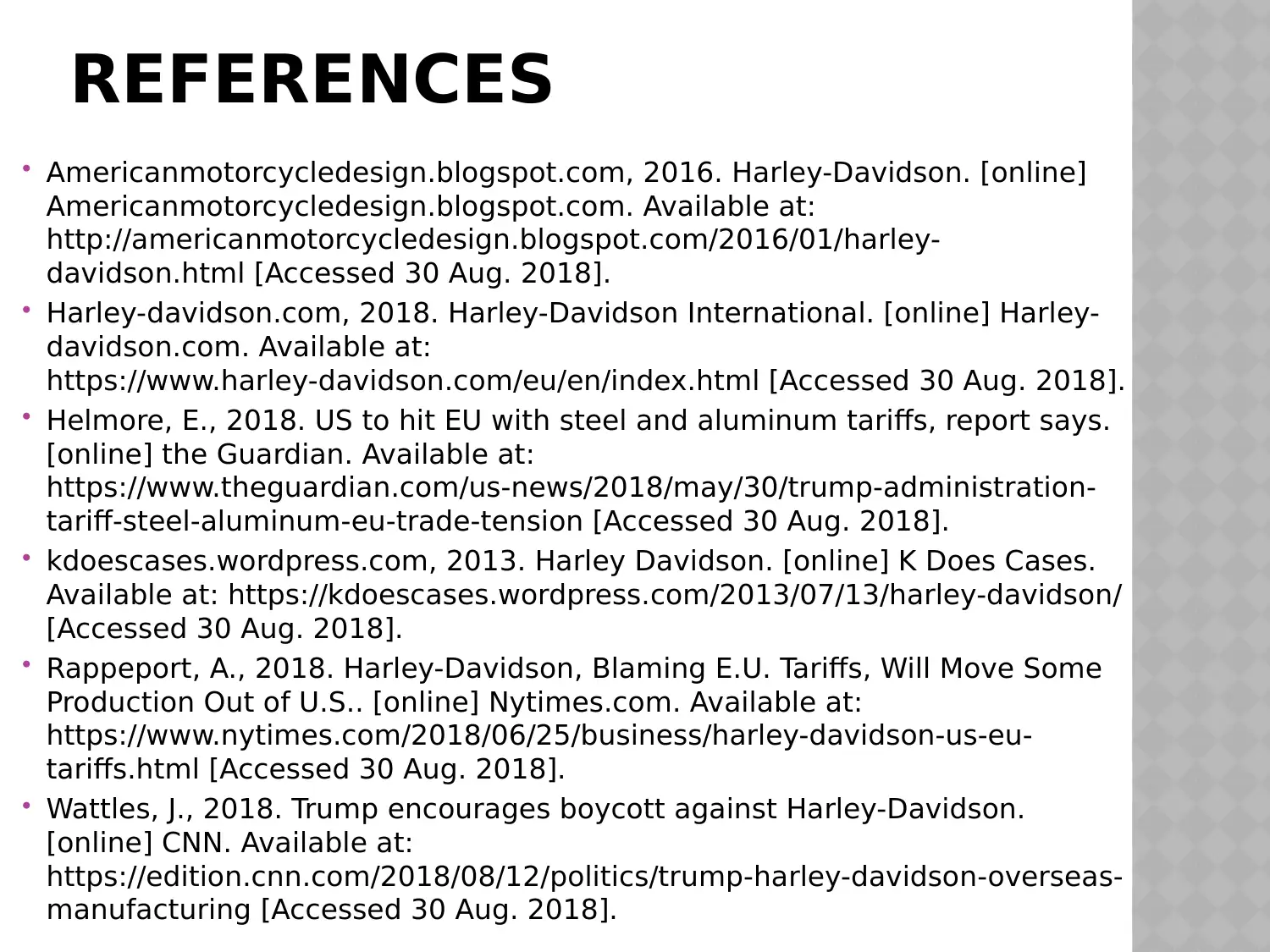
REFERENCES
Americanmotorcycledesign.blogspot.com, 2016. Harley-Davidson. [online]
Americanmotorcycledesign.blogspot.com. Available at:
http://americanmotorcycledesign.blogspot.com/2016/01/harley-
davidson.html [Accessed 30 Aug. 2018].
Harley-davidson.com, 2018. Harley-Davidson International. [online] Harley-
davidson.com. Available at:
https://www.harley-davidson.com/eu/en/index.html [Accessed 30 Aug. 2018].
Helmore, E., 2018. US to hit EU with steel and aluminum tariffs, report says.
[online] the Guardian. Available at:
https://www.theguardian.com/us-news/2018/may/30/trump-administration-
tariff-steel-aluminum-eu-trade-tension [Accessed 30 Aug. 2018].
kdoescases.wordpress.com, 2013. Harley Davidson. [online] K Does Cases.
Available at: https://kdoescases.wordpress.com/2013/07/13/harley-davidson/
[Accessed 30 Aug. 2018].
Rappeport, A., 2018. Harley-Davidson, Blaming E.U. Tariffs, Will Move Some
Production Out of U.S.. [online] Nytimes.com. Available at:
https://www.nytimes.com/2018/06/25/business/harley-davidson-us-eu-
tariffs.html [Accessed 30 Aug. 2018].
Wattles, J., 2018. Trump encourages boycott against Harley-Davidson.
[online] CNN. Available at:
https://edition.cnn.com/2018/08/12/politics/trump-harley-davidson-overseas-
manufacturing [Accessed 30 Aug. 2018].
Americanmotorcycledesign.blogspot.com, 2016. Harley-Davidson. [online]
Americanmotorcycledesign.blogspot.com. Available at:
http://americanmotorcycledesign.blogspot.com/2016/01/harley-
davidson.html [Accessed 30 Aug. 2018].
Harley-davidson.com, 2018. Harley-Davidson International. [online] Harley-
davidson.com. Available at:
https://www.harley-davidson.com/eu/en/index.html [Accessed 30 Aug. 2018].
Helmore, E., 2018. US to hit EU with steel and aluminum tariffs, report says.
[online] the Guardian. Available at:
https://www.theguardian.com/us-news/2018/may/30/trump-administration-
tariff-steel-aluminum-eu-trade-tension [Accessed 30 Aug. 2018].
kdoescases.wordpress.com, 2013. Harley Davidson. [online] K Does Cases.
Available at: https://kdoescases.wordpress.com/2013/07/13/harley-davidson/
[Accessed 30 Aug. 2018].
Rappeport, A., 2018. Harley-Davidson, Blaming E.U. Tariffs, Will Move Some
Production Out of U.S.. [online] Nytimes.com. Available at:
https://www.nytimes.com/2018/06/25/business/harley-davidson-us-eu-
tariffs.html [Accessed 30 Aug. 2018].
Wattles, J., 2018. Trump encourages boycott against Harley-Davidson.
[online] CNN. Available at:
https://edition.cnn.com/2018/08/12/politics/trump-harley-davidson-overseas-
manufacturing [Accessed 30 Aug. 2018].
⊘ This is a preview!⊘
Do you want full access?
Subscribe today to unlock all pages.

Trusted by 1+ million students worldwide
1 out of 12
Related Documents
Your All-in-One AI-Powered Toolkit for Academic Success.
+13062052269
info@desklib.com
Available 24*7 on WhatsApp / Email
![[object Object]](/_next/static/media/star-bottom.7253800d.svg)
Unlock your academic potential
Copyright © 2020–2026 A2Z Services. All Rights Reserved. Developed and managed by ZUCOL.





